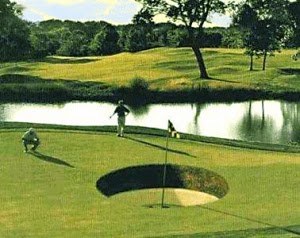A certain level of etiquette is expected when playing a sport like golf. But with the coronavirus (COVID-19) pandemic at play, an added layer of manners is required. Here’s how you can keep yourself safe and respect the safety of others while playing golf during the pandemic.
Show up early. Generally, golfers will arrive 15 minutes before their tee-time. But with the coronavirus, each course has its own safety requirements. Depending on wh/ere you’re planning to play, you could be subject to a brief COVID-19 questionnaire or need to have your temperature taken before you hit the green. Arrive 20-30 minutes before your tee time to ensure you don’t delay your game or those scheduled to start after you.
Avoid crowding on the course. Under normal circumstances, golf can be a fairly social game. With the threat of the coronavirus, socializing with others in a crowd isn’t a good idea. Maintain a distance of six feet from others outside of your golfing party. Walk around other groups if you need to pass them. And when it comes to using golf carts, limit yourself to one rider per car whenever possible. Most courses are mandating this policy unless you’re golfing with someone from your household.
Respect the course. The rules and safety restrictions at the golf course will vary depending on where you golf. Regardless of whether you’re playing at the golf resort in Pinehurst or somewhere in Monterey, it’s essential to follow the rules imposed by the location. Those rules exist to keep guests and the staff safe. Before you arrive, make sure you’re aware of that club’s COVID-19 guidelines as well as the guidelines in that county if you’re traveling out of state. Ultimately, doing your part and following said rules will help stop the spread of the coronavirus so that life can one day go back to normal.
Get creative with your golf tradition. Typically, when a round of golf concludes, a ceremonial handshake occurs. In COVID-19 times, golfers have had to get creative with how they wrap up their game. Instead of shaking hands and risk transmitting the coronavirus, tap putters or do an air five. Any way you choose to celebrate the conclusion of your time on the course will work — as long as it doesn’t require physical touch.
Stay home if you’re sick. Most importantly, if you don’t feel well, reschedule your tee time until you’ve confirmed you aren’t ill or cancel it. You should also do the same if you’ve been in contact with someone who has the virus or has been exposed. Golf courses will always be around, and if you have to reschedule to prevent spreading the virus, it’s worth it!
Golf is one of the few sports people have been able to enjoy during these unprecedented times. To keep that option available, follow these etiquette tips!







